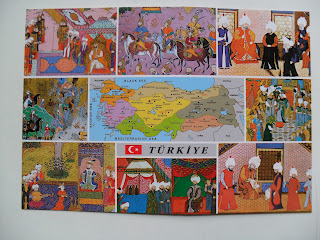(Received in May, 2012)
The name of Turkey, Türkiye in the Turkish language, can be
divided into two components: the ethnonym Türk and the abstract suffix –iye
meaning "owner", "land of" or "related to"
(derived from the Arabic suffix –iyya, which is similar to the Greek and Latin
suffixes –ia). The first recorded use of the term "Türk" or
"Türük" as an autonym is contained in the Orkhon inscriptions of the
Göktürks (Celestial Turks) of Central Asia (c. 8th century). The English word
"Turkey" is derived from the Medieval Latin Turchia (c. 1369). The
Greek cognate of this name, Tourkia (Greek: Τουρκία) was originally used by the
Byzantines to describe medieval Hungarypage (since pre-Magyar Hungary was
occupied by proto-Turkic and Turkic tribes, such as the Huns, Avars, Bulgars,
Kabars, Pechenegs and Cumans.) Similarly, the medieval Khazar Empire, a Turkic
state on the northern shores of the Black and Caspian seas, was referred to as
Tourkia (Land of the Turks) in Byzantine sources. However, the Byzantines later
began using this name to define the Seljuk-controlled parts of Anatolia in the
centuries that followed the Battle of Manzikert in 1071.

Nincsenek megjegyzések:
Megjegyzés küldése